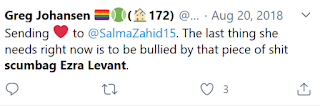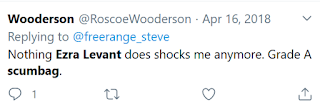Some interesting potential developments in Canadian defamation law that a few of you might find handy, so make yourselves comfortable and pay attention.
As many of you probably know, a fundamental requirement for something to be defamation in Canada is that what is said or published must, by definition, damage or injure or tarnish someone's reputation. This is not a controversial position; it's right there in the law. The group Canadian Journalists for Free Expression (CJFE) explains it thusly:
"Defamation refers to harming another person’s reputation by making a false written or oral statement about that person to a third party.
Defamation law is not about protecting pride; it is about protecting
reputation and offering restitution to people whose reputations have
been wrongly damaged."
So it's all about the reputation and, in most cases, this isn't an issue, as it's widely accepted that if you talk sufficient smack about someone, you've probably injured their widdle feewings in some suspiciously vague and vacuous way, and they get to hurl themselves onto their fainting couch and insist on large amounts of money as the only thing that will make them feel better.
But what about the occasional case where there's unlikely to be any damage to one's reputation because, quite simply, one doesn't have a reputation left to be damaged? What if one is such a vile, despicable, loathsome piece of human garbage that it's impossible to see how a reputation could in any way be tarnished or diminished even further than it already is? Now it gets interesting, doesn't it? But let's talk specifics, because that's where it gets really interesting.
We need to define the word "reputation" because, without that, we can't talk intelligibly about what it means for a reputation to be damaged, so if one checks the dictionary, one reads definitions like "what others think of you" or "the opinion that the general community has of you," that sort of thing. In short, your reputation is defined, not by you, but by others, and this is incredibly important because that is what establishes whether your reputation can be damaged. Let's start with a hypothetical, theoretical example.
Let's say someone called Rebel Media's Sheila Gunn Reid a "racist." If that happened, one might expect that Gunn Reid would throw her stereotypical hissy fit, scream "defamation" and demand reparations since her reputation has allegedly been injured. And this would typically be accompanied by screeching for proof that she is a racist, and so on. But that would, I think, be premature.
A simpler approach, it would seem, would be to suggest that if she already has a reputation as a racist, then there is no defamation, so the simpler approach would be to simply scan the Intertoobz, looking for examples of people calling Gunn Reid a "racist." And if one finds a sufficient number of such examples, then that is, by definition, part of her reputation. There can be no quibbling here; as we have already established, one's reputation is defined by what others think of you, and if, in general, people have no problem describing you as a "racist," then that is your reputation. Period. And if you have a reputation as a racist, then it is physically impossible to injure or damage that reputation by merely repeating what everyone else already says. See how that works?
INTERESTING SIDE NOTE: What's fascinating about the above argument is that, in that (hypothetical, theoretical) example, one need provide no evidence whatsoever that Gunn Reid is a racist as a defense; one need only provide evidence that she has a reputation as a racist, whether that reputation is accurate or not.
Now, I am not a lawyer, but it seems that the above analysis is on fairly firm ground, based on a simple reading of defamation law -- if defamation requires that someone's reputation be harmed, and you can prove that what you said merely matches their widely-accepted existing reputation, then, once again by definition, there can be no defamation.
(I fully expect some lawyer to leap frantically to his keyboard and pound out, "But you haven't taken into account established jurisprudence, as in the case of Kal-El v. Mr. Mxyzptlk 2008 (ONSC), wherein ..."
Shut up.)
Which brings us to one Ezra Levant, for whom every public slight, criticism or condemnation apparently tarnishes his reputation in such an egregious way that nothing but large sums of money can rouse him from his pearl-clutching, inconsolable sobbing. So let's do one more example, this time with exhibits.
Imagine someone had the temerity to publicly describe Ezra as, say, a "scumbag." This would almost certainly inspire a savage, unforgiving letter from whatever law firm had the lack of sense to sign their name to such a letter. Whatever. But rather than bow to demands to produce hard, cold proof of said scumbagitude, given the analysis above, it would seem that a far simpler defense would be to say little more than, "That is the reputation he already has; that is what the general public already thinks of your client." And by way of supporting evidence, one could use nothing more than simple online search engines to back that up.
One could, for example, produce this:
or this:
or this:
or this:
or this:
or this:
or this:
or this:
or this:
or this:
or this:
or this:or this:
or this:or this:or this:
or this:or this:or this:or this:or this:or this:or this:or this:or this:or this:or this:or this:and let's just finish this off with a delightful montage, going all the way back to 2011:
I believe I've made my point but we can make a couple more observations before we leave.
First, the above is just the tiniest sample of what one can find on the Intertoobz if one searches for the delightful combination of the phrases "Ezra Levant" and "scumbag," -- after providing close to 30 examples, I believe I've made my case adequately. (And all that is just from Twitter.)
The more useful observation is that, having provided these examples, I have now paved the way for anyone to snap back with a defense if they end up in this situation. In effect, if my analysis holds up, I have effectively annihilated any possibility of Ezra suing anyone for calling him a "scumbag," as the prospective defendant can simply pop over here and print off this blog post as incontrovertible proof of Ezra's existing reputation. Isn't that convenient?
You're welcome.
AFTERSNARK: Over the next several days or weeks, we will be publishing similar searches for the very phrases that Ezra Levant claims so injured his reputation related to his 2016 Red Cross fundraiser, including:
- "grifter"
- "con man"
- "scam artist"
- "loathsome, vindictive, bottom-dwelling sleazebucket"
OK, I might be making that last one up.
P.S. Remember, this case is going to trial some year, so you're invited to help out at my fundraiser and, in return, I'll keep publishing delightful musings like this. I think that's a good deal.






























1 comment:
If you haven't done a Twitter search on the combination of phrases "Ezra Levant" and "piece of shit," well, you're in for a treat.
Post a Comment